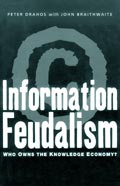Playing knowledge games
 INFORMATION FEUDALISM . Peter Drahos with John Braithwaite . Earthscan Publications Limited . London . 2002 . Rs 920
INFORMATION FEUDALISM . Peter Drahos with John Braithwaite . Earthscan Publications Limited . London . 2002 . Rs 920
In the last two decades, the intellectual property standards have changed drastically. Today, these rules are set by the global strategies of a small number of companies and business organisations. The standards affect basic goods such as seeds, services and information flows in a global trading economy.
'Information Feudalism' tells the story of how the rules were redrawn by powerful corporations and rich countries for their own benefit. And how these have contributed in new inequalities. Patents are being used to lock up vital educational, software, genetic and other information. The multinational global elite dominates the global property and governs seeds for the farmers of developing nations, AIDS drugs for Africa and so on.
This gripping book delves deep to answer the questions: Who owns the knowledge economy? How did rules governing intellectual property become part of the World Trade Organisation's (WTO's) free trade agreements? How have these rules changed the knowledge game for international business?
The book has been divided into 14 interesting chapters. Chapter 4 tells the lead role played by Pfizer Corporation in changing international standards of intellectual property. Chapter 7,8 and 9 reveal the covert deals made at the General Agreement on Tariffs and Trade (GATT) to make intellectual property a part of WTO. The book also suggests ways by which intellectual property rights can be democratically defined and implemented. A must-read for those specialising in global economy.
